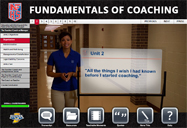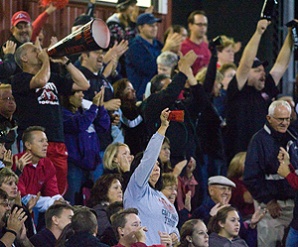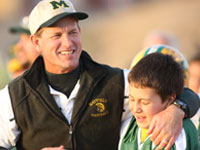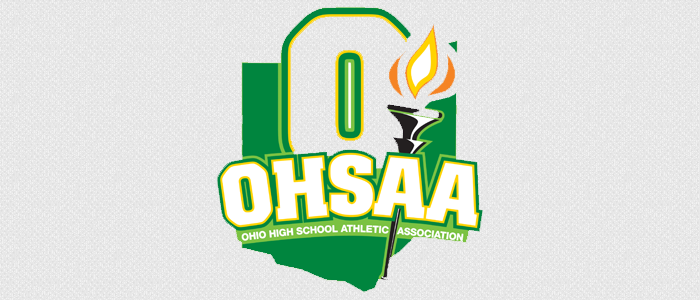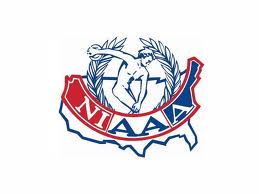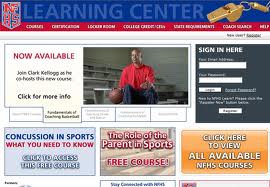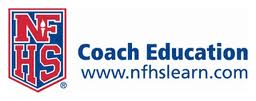“Fundamentals of Coaching” Course – Saturday August 24th at Uniontown Lake High School
Welcome back to the start of another year. If you have any “newbie” coaches who will need to complete the required “Fundamentals of Coaching” course as partial fulfillment of their Pupil Activity Permit (PAP), we will be offering the course here at Uniontown Lake HS on SATURDAY, AUGUST 24th from 8:00 a.m.-Noon.
By taking the classroom version of the course (the content is identical to online) there is a $10 savings ($55 classroom vs. $65 online). Whether your district or the individual coach pays for the course, this is a significant savings to someone.
The registration link with OHSAA will be up later this week; however, if you have a new coach who has not taken the course before and you want to reserve them a spot in the class, simply forward this link to them or email me their contact information. I will connect with the coach to make arrangements for their registering in time.
Feel free to contact me at brownbruce@lakelocal.org or the office (330-877-4288) with any additional questions.
To learn more about what the “Fundamentals of Coaching” class is about Watch the video below.
A Parent’s Guide to Dealing with your High School Athlete
A Parent’s Guide to Dealing with your High School Athlete
BY: DARREN TRACY
It’s almost time for fall sports to begin again, where your son or daughter may be taking the field again as a high school athlete, or maybe even taking the field for the first time as a high school athlete. The transition from “rec” or travel sports to high school sports is a big one, and many an athlete find the transition tough to adjust to. There may be another group that may find it even harder:
I am sure we have all sat through games when our kids were younger, rooting them on, and hoping for our child’s personal and team successes. I have too. Through these many years of watching, there are 12 observations that I have come across that will make watching your child’s games more enjoyable, and allow your child to grow and develop.
1) Grades…. Remember these are “student-athletes” not “athlete-students”, and keeping ones’ grades high should be at the top of any list. The chances of getting a college scholarship through good grades is a 1000 times more likely to happen that through athletics. At least the same amount of time should be put into homework compared to training.
2) The days of “trophies for everyone” are over…. Your child may not get to play all the time, or even at all. Kids will learn from these disappointments, learn how to deal with them, and become better for it. They WILL make mistakes. Everybody does. That leads to the third observation I have seen:
3) Don’t be afraid of demanding coaches…. Quick question: In your mind, think of the three favorite teachers you have ever had. Done? Ok, think of the three most demanding teachers you have ever had. My bet is that at least two of the three favorites are the same. Coaches are going to be demanding. They should be. Coaches are going to yell and scream. It’s in a coaches demeanor to do that (within reason of course). Your kids can handle demanding coaches. They are stronger than you think.
4) The coach is the coach…. Too many parents think they are coaches. If an athlete is coached to do a certain skill by his or her coach, it’s the same way he or she should practice it at home. Find out how the coach is teaching a certain drill, and use THAT way to practice at home. In a kid’s mind, there may be a “Too many Chiefs, and not enough Indians” dynamic going on in his or her head. Be consistent when helping your child. Your first question you should ask as a parent when wanting to help your child is: How is coach teaching it?
5) High school sports are serious, but it isn’t the biggest deal in the world…. One of the worst offenses I have seen. Share in your child’s successes, both personal and team wise. Make sure they know how to handle defeat and disappointment. Don’t allow them to get too high after a win, or too low after a loss. Try to keep them as “flatlined” as possible. Remember, it is your CHILD’S dreams, not YOURS as a parent.
6) Keep your expectations realistic…. Don’t “set the bar” as far as what you expect from your child. There are many, many cases of star athletes in grade school and middle school that don’t get any better when they are in high school. There are just as many cases of athletes that all of a sudden have a growth spurt, or refine their skills and become great contributors to their high school teams. Just because a school may have a great freshman class, doesn’t mean they will all be stars in the next four years.
7) Be realistic about your child’s ability…. Not every child is going to go to Duke to play basketball, Michigan to play football, Stanford to play baseball, or UCLA or Penn State to play volleyball. Your child probably already knows what he or she did wrong (the coaches have already told them), so unless he or she asks, leave it alone. There is a huge difference between “discussing” with your child, and “pushing” your child. Learn to know the difference.
8) Stay out of the way, except for one situation…. Remember, it is what your child has chosen to do. It is THEIR dream, not YOURS. Let them choose how much they train, how much they lift, and how much they run. You can “encourage”, but the final decision should be the child’s. There is only one exception, and that is when the issue of quitting a team comes up. Quitting is not an option. Your child will be much better off learning how to overcome the adversity, than just throwing in the towel when things don’t go his or her way.
9) Don’t approach the coach with questions, have your child do it…. How many of you know of parents that call the coach when things aren’t going their child’s way? Ok, everyone put your hands down. We all know of someone. Your kids are at the age where they should be approaching the coach themselves. Always wait a day or two to talk to a coach and allow some time to calm down, so that there can be a clear discussion between player and coach. Your child with have to deal with talking to adults in life, weather it be a boss, teacher, or anyone else of authority. Why not start now?
10) Know the difference between pain and injury…. Everyone has heard the phrase “no pain, no gain”. Don’t believe it. There are always going to be bumps and bruises, that is a given, especially the day after a game. If a “pain” lingers on for more than a few days, go get your child checked out. He or she is not only hurting the team by playing injured, but also risking his or her future health.
11) Behave yourself during the game…. There is nothing more embarrassing than seeing a parent yelling and screaming, cheering for only his or her kid, and generally making a fool out of him or herself. Cheer for your TEAM, not just your child. Form relationships with the other parents. If you can’t act with some class and dignity, then stay home. Your child will appreciate you not being singled out for being a jerk.
12) Savor every moment…. Four years of high school sports go by quick. It’s the kind of thing that your child and you will enjoy sharing in the future. Make it enjoyable for both you and your child. Before you know it, he or she will be gone.
NFHS, PlayOn! Sports Announce Plans for High School Sports Network
NFHS, PlayOn! Sports Announce Plans for High School Sports Network

Joint Venture Would Create Central Destination, Expanded Coverage of High School Sports
The National Federation of State High School Associations (NFHS) and PlayOn! Sports (PlayOn) plan to create and launch the NFHS Network, an all-digital network devoted to coverage of high school athletic content through the Federation’s state association members. The NFHS Network, with an anticipated start date at the beginning of the 2013-14 school year and featuring comprehensive coverage of boys and girls sports and activities from across the country, will be a subscription-based digital service available at NFHSnetwork.com.
Each of the 51 NFHS state association members has the opportunity to join the NFHS Network to showcase its high schools, student athletes and tournaments. While states will continue to maintain local media relationships, the NFHS Network will become the largest aggregated destination for coverage of high school sports in the country, thus creating increased viewing opportunities for students, parents and fans – wherever they may be in the world.
“With 19,000 high schools in the United States and nearly two million events held annually across the country, we are very excited about this enormous opportunity,” said Bob Gardner, executive director of the NFHS. “Once launched, the network will help the Federation showcase its primary mission of expanding participation and opportunities for involvement in education-based interscholastic sports and performing arts activities. We are excited to provide viewership opportunities for fans of high school athletics all over the country.”
The new NFHS Network will build on the existing success of the PlayOn digital platform and high-quality coverage of high school sports. PlayOn currently streams nearly 30,000 events per school year on its national digital portal in addition to producing and distributing television coverage of select championship events. PlayOn works with 32 state associations and sections in 26 states, as well as more than 600 high schools across the country that have adopted PlayOn’s technology platform to self-produce their school’s sports and activities.
“Teaming up with the NFHS is a natural progression to build a truly national high school sports platform while honoring the local communities that support them,” said David Rudolph, PlayOn! Sports chief executive officer. “Our mission is to serve the current and future generations of student-athletes, support and encourage their participation and make their performances accessible to their friends, family and fans on every media platform they use.”
Nearly 50 million Americans identify themselves as high school sports fans and high school events have three times the attendance of college and professional sporting events combined. Couple this passionate fan base with the usage of smartphones and other connected devices and the NFHS Network will become a consolidated high school destination for schools, student-athletes, families, fans, alumni and advertisers.
“We are building a network for the next 40 years,” Rudolph continued. “The NFHS Network is being designed for the next generation of consumers who are driving the consumption of content in a multi-screen environment. These digital natives will set the stage for the success of the NFHS Network.”
The NFHS Network is a joint venture between the NFHS and PlayOn! Sports and will be governed and overseen by a combination of NFHS and PlayOn executives. Both Gardner and Rudolph worked with numerous state association executive directors for more than seven months to develop the concept and agreement. The NFHS Network is structured to provide all state associations with the opportunity to participate, providing a framework for a true national footprint for high school sports.
“Ultimately, we want to make the NFHS Network the most treasured and trusted source for high school athletics,” Gardner said.
NFHS Network: We are High School.
About PlayOn! Sports
PlayOn! Sports is the largest rights holder, producer, and aggregator of high school sports events distributed across television, the Internet, and IP-video enabled mobile devices. By combining State Athletic Associations’ postseason content with the regular season events of member schools, PlayOn streams more than 30,000 high school sporting events a year, providing marketers with a unique multi-media platform solution to reach teens, young adults and families. PlayOn is headquartered in Atlanta, Ga., with offices in the Southeast, Midwest and California. View the PlayOn! Sports Network at www.playonsports.com and follow us on Twitter and Facebook @playonsports.
Examining the Responsibilities of Being a Great Coach
By Chris Stankovich, Ph.D.
Being an interscholastic sports coach can be an incredibly fun and rewarding experience, but with the privilege of being a coach also comes a lot of responsibility. As youth sports continue to evolve, coaches are often faced with new and sometimes complex issues to address. How coaches resolve the issues they experience has a direct impact on the kids they coach, for better or worse.
To read more click on Examining the Responsibilites of Being a Great Coach
Remember the Forgotten Priorities
With fall sports starting this week and the beginning of the school year right around the corner, athletic directors and coaches (and their families) will return to the life of working late and working often.
The article below is a reminder to all athletic directors and coaches that we must not forget to make time for our family, spouse, and and our health.
Remember the Forgotten Priorities – by Marc Jensen
OHSAA Issues Guidance for Schools Following Changes in State Law
Due to recent changes in state law, the OHSAA has issued guidance for member schools regarding students who are home educated or who attend non-public schools that do not sponsor sports.
http://www.ohsaa.org/eligibility/4-3-1Guidance-July2013.pdf
Importance of Joining the National Interscholastic Athletic Administrators Association (NIAAA )
The Importance of Coach Education and NFHS’ E Learning Tools for Coaches
Below is an interview with NFHS Executive Director Bob Gardner. In the interview, he explains the importance of Coach Education and the value of the NFHS’ E Learning Tools for Coaches.

Interview on NFHS’ E Learning Tools for Coaches with NFHS Executive Director Bob Gardner
Why Require Coaches to be Certified?
Below is a recent article by Tim Flannery on the NFHS recommendation that all school districts require that interscholastic coaches become certified as an Accredited Interscholastic Coach.
Tim is former A.D. at North Olmsted and is a past president of the OIAAA. He is being inducted into the NIAAA “Hall of Fame” in December at the national conference in Anaheim.

Why Require Coaches to be Certified?
Why should the National Federation of State High School Associations (NFHS) recommend that all school districts require that interscholastic coaches become certified as an Accredited Interscholastic Coach (AIC)? That question is being asked across the United states by school administrators, coaches and parents. AIC certification is earned when an individual completes four online courses, pays a $10 application fee and fills out a short profile form at www.nfhslearn.com
The answer to this question involves the health and safety of the students who participate, the legal responsibilities of the school district and coaches, and the elevation of interscholastic coaching to a profession through ongoing professional development.
Let’s consider each of these important reasons:
For the Health and Safety of the students who participate
A coach’s primary role is to make sure the students who participate are safe from potential harm and are cared for properly in the event of an injury. In addition, coaches are supposed to model the positive behaviors that will teach young people valuable lessons that can be used later in life.
Hardly a day goes by that we don’t hear on local television, in newspapers, or on the internet about a school coach who has acted inappropriately. Here are few headlines to make the point. These are the kind of headlines that can turn your school district upside down.
“High School Football coach charged in inappropriate relationship with a student” “Hockey coach charged in hazing ritual involving his team”
“Coach accused of using demeaning behavior and foul language by players”
“Local school coach charged with sexting with several members of the spirit squad”
Most states now require all new coaches to complete the NFHS Fundamentals of Coaching course, which is designed to educate coaches on all aspects of coaching at the interscholastic level. To address abuse concerns, the NFHS developed a free online course “Creating a Safe and Respectful Environment” to educate coaches regarding their role and responsibilites in dealing with inappropriate student behavior, modeling respectful words and actions, hazing and bullying and other abusive scenarios.
For the school district
Schools are judged by the quality of their academic, athletic and fine/performing arts programs. A school’s reputation can hang in the balance if any one of these programs is called into question. Is your team(s) an example of a program that wins with dignity and loses with class? Ask any opposing player, coach or parent which teams in your league model positive and respectful behavior and they will tell you in an instant. Is your team or program one that they would name?
School administrators and coaches must fulfill a number of legal duties to ensure that students participate in a healthy and respectful environment. One of the important legal responsibilities for school administrators is to select and train coaches and prepare them for their role as a teacher-coach in an educational institution. The training must relate to coaching in a school setting, which is vastly different than coaching a club team or community program. We sometimes refer to athletic programs as the “front porch of the school,” meaning that sport programs are the first thing the community sees. That perception may well determine the level of support the school district receives from voters when considering funding to operate a quality program.
Preserve education-based athletics in our schools
Athletics has been a part of our schools since the mid-1800’s. The United States is only major country that offers interscholastic sports as an extracurricular activity to over 7.5 million students who participate annually. One of the main reasons we offer these programs is the educational benefits students can derive from their participation.
Athletic programs face many challenges that some day may threaten their existence. Among these threats to school-based sports programs are the following: pay-to-play, financial cutbacks in athletic programs, the conflicts with club sports that force students to choose, parental pressure on coaches, state legislatures, and the influence of professional sports in our society. However, no challenge is greater than untrained coaches who often times put winning ahead of their primary role as a teacher- coach, which uses the sport experience to promote learning. When coaches put winning ahead of the educational outcomes (healthy lifestyles, good citizenship, sportsmanship, etc.) it “contaminates” the experience for the students who participate. This can result in negative effect on the students we serve.
Many people, including some of our coaches, have lost sight of the mission and purpose of interscholastic sport by placing an undue emphasis on winning at the expense of the educational mission. Sports are not automatically educational; however, if used appropriately sport can be a powerful learning tool. “Done right,” participants can learn important life lessons that cannot be learned in the classroom. What the coach chooses to teach and model determines to a large degree what students will learn from the experience.
The good news is that the skills a coach needs to make the sport experience educational can be learned. Schools must provide coaches the training and tools necessary to educate them in how to fulfill their role as a teacher first and a coach second. The NFHS Coach Education/Certification has over 34 courses schools can use to train and educate coaches. This information translates directly into real-life coaching situations.
Stay current in the ever changing profession of interscholastic coaching
Whether it is education, law, medicine or any profession, isn’t it important to stay current with best practices, new policies, and dealing with new issues? If coaching is ever going to rise to the level of a profession, coaches need to be current in teaching methods, minimizing risks, communicating and
motivating, administering their team or program and teaching students to be the best they can be in sports and in life.
Coaches who have not been educated on how to deal appropriately with such issues as concussion, hydration, non-abusive environment, sexual harassment and other topics have cast a dark shadow on some school teams and programs. Parents whose children participate in interscholastic sports assume the coach is knowledgeable in all areas of coaching. This expectation is real and warranted, and parents will hold coaches and school districts responsible if these issues are not dealt with appropriately.
The NFHS Board of Directors approved a coach education position statement in 2013 that recommends that school provide both initial training and ongoing professional development throughout the coach’s career.
If every school district in the United States followed the recommended coach education position statement, it would go a long way in providing the students we serve a positive learning experience, a safe environment, protection for the school district in a legal action, and help to preserve the institution of education-based sports for future generations.
Along with the goal of making coaching a profession is the value of building credibility with students, parents, school administration and the community. Credibility is not automatically given;-, it must be earned. This may be bothersome to those coaches who may have grown up in a time and place where respect was given without questions being asked. Things have changed; we live in a time where everything is questioned. For coaches to earn respect, they must understand how to play the role of the coach in an education-based setting. Every coach should strive to build credibility in several key ways.
Key #1 Coaches must demonstrate professionalism in their actions
- Prepare for practices and games. Make sure these practice plans are in writing.
- Submit required reports to the athletic department on time: before, during, and after theseason.
- Communicate effectively with students and parents. Develop an enforceable parent/coach communication policy.
- Conduct a preseason meeting with students and parents to communicate philosophy, parent/coach communication policy, teamsrules and expectations of students and parents.
- Model the behavior you want your students to exhibit, including but not limited to dress, language, sportsmanship, healthy lifestyle, and respect.
Key #2 Consistently communicate and enforce all rules and policies to students and parents including:
Team rules including codes of conduct.
- Athletic department polices including transportation, physical forms, use and care of equipment and uniforms and warning of the risk of participation.
- School rules including attendance, eligibility, grade point average etc.
- League rules.
- State association regulations.
- Playing rules of the sport.
Key #3 Demonstrate expertise in your sport
- Strive to be the most knowledgeable coach in your sport in your school, district and league.
- Teach the most up-to-date tactics and techniques of your sport.
- Join your local, state, and national coaching organizations. Volunteer to serve on committees or other leadership positions in the organization.
- Become an Accredited Interscholastic Coach (AIC) by completing the NFHS Fundamentals of Coaching, First Aid Health and Safety for Coaching, Fundamentals of Coaching (your sport) and Concussion in Sport-What You Need to Know courses.
- Commit to being a better coach by attending clinics, taking additional course work or becoming an Accredited or Certified Interscholastic Coach. Be a lifelong learner.
Key # 4 Support the school and athletic department philosophy and be a team member in the athletic department
- Actions must match your words.
- Keep a “student first and athlete second” mindset when making decisions.
- Treat your students as good parents would.
- Handle disagreements with students, parents, other coaches or the athletic department in private.
- Share facilities with other coaches in the building.
- Share athletes with other sports and discourage specialization.
- Share expertise with less experienced coaches. Be a mentor to others.
Work at developing positive relationships with other coaches and teachers even if you are not a teacher in the building.
There are many things interscholastic coaches should know and be able to do before they have contact with students and throughout their coaching career. NFHS Certification is a major step toward:
- ensuring that the health and safety our students is first and foremost in the minds of our coaches.
- allowing our school districts to say with certainty in a court of law that the coach was provided the proper initial and ongoing training necessary to perform the duties expected of an interscholastic coach.
- preserving interscholastic sport in our schools as an extension of the classroom where student participants learn important lessons of living a positive, healthy and productive life.
- Providing the coach a credential that signifies completion of content covering critical aspects that coaches should know.




